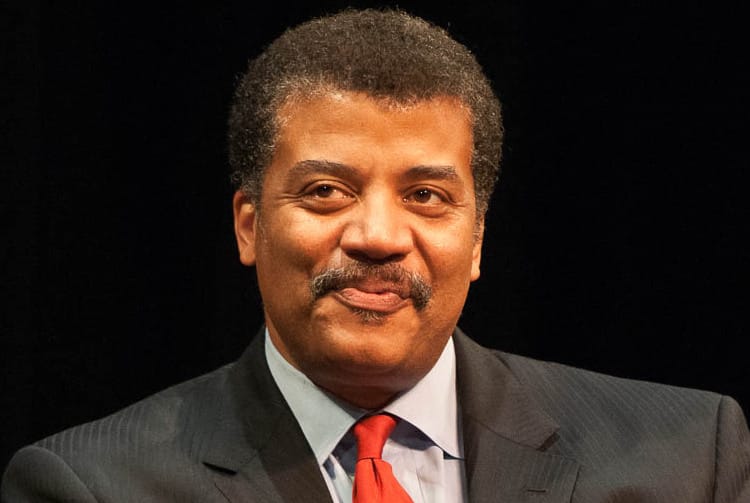He may have what he’s described as only “the Reader’s Digest knowledge of Buddhism,” but famed astrophysicist Neil deGrasse Tyson is a fascinating thinker in just about any capacity.
So: what does he think about how Buddhist thought and science may or may not intersect? Can they learn from each other? That’s what author Jerome Freedman wanted to know when he sat down with Tyson in 2011. The outspoken Tyson, unsurprisingly, offered skeptical and thoughtful insights into Buddhist philosophy and the nature of the universe, and you’ll find a number of these distilled here in excerpts adapted from the full conversation (which you can read or order a copy of on Freedman’s website, here). Read on for Tyson’s thoughts on the Buddhist ideas of interconnectedness and impermanence, and how a Buddhist outlook might be more conducive to science.
Interconnectedness
There is a risk inherent in exploring overlap and resonance between science and spirituality. It’s very easy to ignore that which doesn’t resonate and sift through what does, and come to the misleading conclusion that Buddhism is perfectly aligned with modern cosmology.
In modern times, we have come to learn about ecology, the interdependence of life, animal life, plant life, water supply, and the atmosphere as a system. Systems engineering is all about interconnectivity and parts that create one functioning whole.
You could say that Buddha knew this from the beginning. However, before the 20th century, what a human did had very little consequence outside of their system. People were far enough apart that their behavior would not necessarily affect others. Back then, interconnectedness had very little meaningful consequence to anything.
Today, we fly airplanes from continent to continent; insects and vermin ride ships from one place to another; we change gases in the atmosphere here that circulate around the globe. To say that we are interconnected today with the same fervor as we were interconnected a thousand years ago is just misusing the word. If you don’t distinguish those two cases, it’s hard to have a conversation about what it means to be interconnected.
In our galaxy, we feel the gravity of another galaxy. We are going to collide with the Andromeda galaxy. That’s scheduled to happen after the sun dies. So, you can say we’re still all connected. But it’s kind of irrelevant because we’ll be vaporized.
Furthermore, there’s a horizon of the universe that’s expanding. Beyond that horizon, we don’t even feel each others’ gravity. It’s beyond any accessibility to us. So everything is not connected in the same way as ecosystems around the world.
Your carbon atoms are not affecting the carbon atoms across the universe. They are not connected in the way we speak of connectivity in the global ecology for example. Cosmologically speaking, the fact that we share the same ingredients doesn’t mean we’re causally connected in any fundamental way.
There’s a huge spectrum of connectivity, some of which is just simply irrelevant to anything that matters to anybody at any time, at any place. On that spectrum, the word rapidly loses its utility. If you were going to put all of this variation of cause and effect under the same word, then there’s no way to test the concept if anything works for it. It’s the old saying, if it explains everything, then it explains nothing.
It becomes metaphysics at that level. And metaphysics has never been accused of being useful. But it provides great conversation with a beer at a pub.
In my concluding words from The Universe series, when I say “we’re connected,” what I mean is that the carbon that is in your body is the same carbon that is across the universe. And it has similar points of origin — origin in the centers of stars. That shared identity is what I call the connectivity.
For me, that shared genetic, atomic, and molecular heritage allows me to feel a part of the universe in a way that might not have otherwise empowered me to do so.
Impermanence
I have something to say about impermanence. I love comparing time scales of things. That’s a favorite past time of the astrophysicist. There is the time scale that is the mother of all time scales, and that’s the decay of the proton, if it decays at all. 1030 years is the latest calculation. Or 1032. That is 20 orders of magnitude longer than the current age of the universe.
So even a proton decays. That’s the most stable known particle. So you can say Buddha had it, even there. But then, once again, it explains everything. And therefore leaves us with nothing. So it’s not really a scientifically useful concept.
If you want to assume everything decays, you’ve got the proton — one sextillion times the age of the current universe — the current theories say that it will decay and then you’ve got everything. Chock it up as Buddhistic if you like!
Rationality
It’s not science if you can’t make a testable prediction. It’s metaphysics. There are tremendous metaphysics traditions in the Far East, but none of it leads to scientific discovery. But, let’s not distract ourselves with the absence of quantitative value to these teachings. There are statements about the physical world in Buddhism that are less conflicting with what science has revealed about the natural world than other religious philosophies. In Buddhism, there’s not a challenge to reconcile with science, because the spirituality doesn’t really prevent Buddhists from having those thoughts.
Science was invented in the west. But, had it been invented in the east, had it been invented in both places at the same time, I bet you it would have risen faster in the east then it did in the west. That’s my hypothesis.
